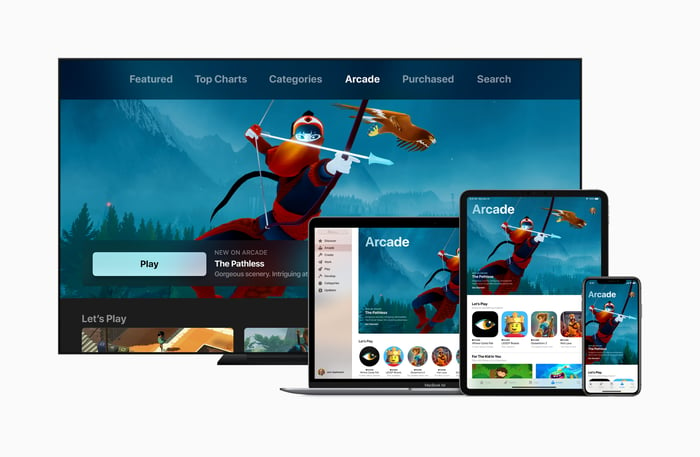Launched in the latter half of last year, Apple (AAPL -3.03%) Arcade is one of the Mac maker's most promising new subscription services and has the potential to shake up the economics of the mobile gaming industry. The company could even potentially cannibalize itself as it undermines other models like in-app purchases, which it gets a cut of, or ad monetization. Meanwhile, Apple continues to face intensifying antitrust scrutiny across many other parts of its business, recently getting hit with a $1.2 billion fine by French authorities over allegations of anticompetitive practices in wholesale distribution.
Does Apple Arcade add to the growing list of anticompetitive concerns?

Apple Arcade launched in September. Image source: Apple.
No game streaming allowed
Bloomberg points out that the slew of new game-streaming services that other major tech companies have launched recently are currently banned from the App Store. Alphabet subsidiary Google launched Stadia a couple months after Arcade, Microsoft is gearing up to launch its xCloud platform, and NVIDIA opened the doors to GeForce Now earlier this year.
Apple confirmed in January that its active installed base of all devices had hit 1.5 billion, of which around 1 billion are iOS devices that predominantly rely on the App Store for games, media, and content. That doesn't mean there are 1 billion iOS users, as some people have multiple devices, but that's still a massive audience for developers to chase after.
The key technical distinction between Apple Arcade and those other services is that Apple Arcade does not stream the game directly to the device. Games are downloaded and can be played offline, while game-streaming services run the content on distant data servers and beam the game to the device.
Developers can often bypass various App Store restrictions by going through Safari, Apple's mobile web browser, instead, but in this case those services don't work in in browsers, Bloomberg notes. It's also worth pointing out that Apple requires all web browsers to use the same underlying web rendering engine, WebKit, another antitrust concern.
Many companies are frustrated with Apple's antics, such as Epic Games CEO Tim Sweeney. Epic Games makes the wildly popular Fortnite and launched the Epic Games Store in late 2018 to compete with Steam in PC game distribution.
Apple can't go on like this. Their bans on competing apps and competing payment services on iOS is breaking the evolutionary cycle of technology and even economics:https://t.co/UOW7shgN4L
— Tim Sweeney (@TimSweeneyEpic) March 25, 2020
Technical differences aside, all of these competing services are targeting the massive mobile gaming industry, which is larger than the PC, console, and handheld gaming sectors combined. Don't be surprised if regulators rope Apple Arcade into the ongoing investigations.





